INDIA
Progress and Activities
2025 Updates
 Theni Farmer Receives State Award for Highest Productivity in Tamil Nadu
Theni Farmer Receives State Award for Highest Productivity in Tamil Nadu
[January 28, 2025] R. Murugavel, an SRI farmer from Vadugapatti in Theni district, Tamil Nadu, was congratulated
 by District Collector R.V. Shajeevana, officers and farmers associations on January 27, 2925, for receiving the State-level award for recording the highest productivity. Thanking Chief Minister M.K. Stalin for giving him the recognition, he said the award in the name of Dr. Narayanaswamy Naidu and the cheque for ₹5 lakh were a big motivation to the entire farming community of Tamil Nadu to achieve. Using SRI methods, Mr. Murugavel had harvested 10,815 kg of produce from one hectare, the highest in the State, during the 2023-24 season. [See Hindu article for details.]
by District Collector R.V. Shajeevana, officers and farmers associations on January 27, 2925, for receiving the State-level award for recording the highest productivity. Thanking Chief Minister M.K. Stalin for giving him the recognition, he said the award in the name of Dr. Narayanaswamy Naidu and the cheque for ₹5 lakh were a big motivation to the entire farming community of Tamil Nadu to achieve. Using SRI methods, Mr. Murugavel had harvested 10,815 kg of produce from one hectare, the highest in the State, during the 2023-24 season. [See Hindu article for details.]
2020
 Nagai Farmers Reap Success using SRI Method in Tamil Nadu
Nagai Farmers Reap Success using SRI Method in Tamil Nadu
[February 12, 2020] Four farmers have reaped success with System of Rice Intensification (SRI) method of cultivation, even as many farmers chose direct sowing and some opted for the conventional transplantation method. G Jeevanatham, R Rajkumar, S Raju and P Elancezian from Kilvelur, Keezhaiyur, Kollidam and Thirumarugal, respectively - received ‘Best Farmer’ awards from their respective blocks on Republic Day for their success with SRI . [See New Indian Express article for details.]
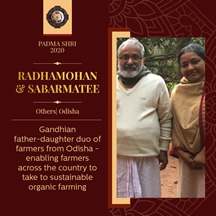
 Sabarmatee and Radha Mohan Awarded Padma Shri for 30-year-long Conservation Experiment
Sabarmatee and Radha Mohan Awarded Padma Shri for 30-year-long Conservation Experiment
[January 27, 2020] Radha Mohan, a retired economics professor and his conservationist daughter, Sabarmatee, have been conferred with the prestigious Padma Shri Award – a recognition for their decades-long efforts to transform a barren land into a lush food forest in Odisha’s Nayagarh district. Founded by the duo in 1990, Sambhav, the resource centre, has become a torch-bearer in the field of conservation, agriculture and organic farming. Sabarmatee, a long-time SRI champion, uses SRI methods Sambhav to conserve 500 indigenous varieties of rice, which she shares through her "Adopt a Seed" program. Sabarmatee is well-known in India, as well as the global SRI Community, as a SRI pioneer and champion in India. [See Hindu article, SRI4Women blogand Kalinga TV broadcast for details.]
 Award for Highest SRI Yield Awarded to Erode District Farmer in Tamil Nadu
Award for Highest SRI Yield Awarded to Erode District Farmer in Tamil Nadu[January 27, 2020] On Janaury 26, Chief Minister Edappadi K Palaniswami presented Tamil Nadu State awards, which included a special award for obtaining a highest yield of paddy through System of Rice Intensification (SRI) method to S Yuvakumar, a farmer from Kunnangattu Valasu, Pasuvapatti village in Erode district received special award for highest yield by adopting SRI method. Award carries cash prize of Rs 5 lakh and a medal.
 Indian SRI Research Items in the SRI Global Research Database Reach 685
Indian SRI Research Items in the SRI Global Research Database Reach 685
[January 15, 2020] At the close of 2019, the number of items in the India SRI research collection maintained by SRI-Rice stood at 685-- 548 of which are journal articles that address SRI in India. (The global database for all countries at the beginning of 2020 had 1,682 items). All these items are available in the SRI Research Database, which is maintained as a group library attached to the SRI Research Network on Zotero. The abstracts, meta data, and full text of non-subscription items is freely available in the library. (However, to access full text of some subscription material, you will need to join the SRI Research Network (also free of charge.) [Questions? Contact SRI-Rice.]
 Economic & Polical Weeky Article Recounts SRI Successes in Tamil Nadu
Economic & Polical Weeky Article Recounts SRI Successes in Tamil Nadu
[January 11, 2020] An article Economic & Political by Vibhu Nayar et al focuses on SRI and rice production learnings from a large irrigated agriculture management project in Tamil Nadu, where the extreme variation in rainfall had reduced the availability of water to agriculture and caused the groundwater table to fall by 37%. The production of rice, an important crop, had became particularly precarious. The World Bank project IAMWARM, which was implemented from 2007 in four phases in 61 sub-basins, used a well-designed upscaling strategy to boost and sustain the production of rice; it also helped the build-up of organic matter and improved soil fertility. This experience, shows that the System of Rice Intensification offers an attractive opportunity for increasing food production per unit of water and improving efficiency. [See EPW article for details.]
2019
 Indian Research Items in the SRI Global Research Database Pass the 600 Mark!
Indian Research Items in the SRI Global Research Database Pass the 600 Mark!
[January 15, 2019] As 2019 was ushered in, the number of items in the India SRI research collection maintained by SRI-Rice surged past the 600 mark, and may soon make up half of all SRI research published in scientific publications that we know about. (The global database currently has 1,490 journal articles, theses, etc.) Our India research collection now has 494 journal articles that address SRI in India, 23 theses (although there are many more that are not published online!), and some additional items in other formats. All these items are available in the SRI Research Database, which is maintained as a group library attached to the SRI Research Network on Zotero. The abstracts, meta data, and full text of non-subscription items is freely available in the library. (However, to access full text of some subscription material, you will need to join the SRI Research Network (also free of charge.) [Questions? Contact SRI-Rice.]
 L. Narayana Reddy, SRI Pioneer, Passes Away
L. Narayana Reddy, SRI Pioneer, Passes Away
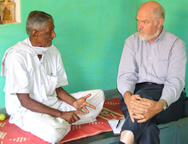 [January 14, 2019] L. Narayana Reddy, organic agriculture and SRI pioneer in India, passed away on January 13, 2019, at the age of 84. He was conferred the Nadoja honour by Hampi University and the Karnataka Rajyotsava award and was known for his inspiring talks and weekend classes on organic agriculture at his farm. Reddy made various presentations in Europe and received visitors from around the world; he is shown at right with Norman Uphoff, SRI-Rice Senior Advisor, who visited him during an SRI visit to India during 2016. Inspired by Masanobu Fukuoka, Reddy started practicing organic farming in 1976; Fukuoka visited his farm in 1988. His passing is a loss for the SRI Community worldwide. [See article in the Times of India.]
[January 14, 2019] L. Narayana Reddy, organic agriculture and SRI pioneer in India, passed away on January 13, 2019, at the age of 84. He was conferred the Nadoja honour by Hampi University and the Karnataka Rajyotsava award and was known for his inspiring talks and weekend classes on organic agriculture at his farm. Reddy made various presentations in Europe and received visitors from around the world; he is shown at right with Norman Uphoff, SRI-Rice Senior Advisor, who visited him during an SRI visit to India during 2016. Inspired by Masanobu Fukuoka, Reddy started practicing organic farming in 1976; Fukuoka visited his farm in 1988. His passing is a loss for the SRI Community worldwide. [See article in the Times of India.]
2018
 Presentation at SRI-LMB Final Workshop in Thailand Highlights SRI/SCI Experience in India
Presentation at SRI-LMB Final Workshop in Thailand Highlights SRI/SCI Experience in India
[November 3, 2018] B. C. Barah represented the Indian SRI Community at the Workshop for the Project on Sustaining and Enhancing the Momentum for Innovation and Learning on SRI in the Lower Mekong River Basin (SRI-LMB), held November 1-2, 2018, in Bangkok, Thailand. While there, he gave a presentation entitled Upscaling Strategy for Agro-Ecological Innovations for Food Security (with a special focus on SRI/SCI). SRI-LMB, an EU-financed regional project, aimed to contribute towards enhancing the resilience of rainfed farmers confronting climate change variability in the Lower Mekong River Basin (LMB) region. The project is led by the ACISAI Center of the Asian Institute of Technology (AIT) in four countries from 2013-2018. (See Final SRI-LMB Workshop report.)
 India Represented at SRI Asia Networks Workshop in Johor, Malaysia
India Represented at SRI Asia Networks Workshop in Johor, Malaysia

[November 1, 2018] Debashish Sen, Amod Thakur, and R. Mahender Kumar represented India at a workshop for SRI national networks held in Johor Bahru, Malaysia, on October 18-19, 2018. The Workshop to Enhance Cooperation and Sharing among SRI National Networks in Asia, which was organized by the Malaysian Agroecology Society (SRI-Mas), the ACISAI Centre at the Asian Institute of Technology, and SRI-Rice, was intended to share experiences and to investigate opportunities to collaborate on scaling-up, multi-country research, value chain improvements, accessing resources, and capacity building for SRI networks. The event also mapped out the possibilities for forming an Asia SRI Regional Network from the existing SRI networks in Bangladesh, India, Indonesia, Japan, Malaysia, Nepal, Philippines, Taiwan and Vietnam. Dr. Sen, head of both the India Consortium on SRI and the People's Science Institute, made a presentation on the current state of SRI promotion and adoption in India and discussed how the Consortium could possibly benefit from and contribute to an SRI Regional Network for Asia. The details on the operation of the forthcoming SRI Asia Network, which will possibly be headquartered at the Asian Institute for Technology's ACISAI Centre, are expected to be worked out during 2019.
 SRI Researchers from India Present at 5th
International Rice Congress in Singapore
SRI Researchers from India Present at 5th
International Rice Congress in Singapore
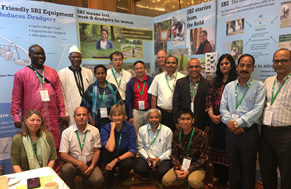 [October 21, 2018] Amod Thakur, R. Mahender Kumar, Debashish Sen, and Sabarmatee joined an SRI contingent participating in the 5th International Rice Congress, held October 16-18, 2018, in Singapore. In addition to SRI presentations by Thakur and Kumar made during the regular sessions, the four participants were part of a side event on SRI research that provided an overview of global research on SRI. The opening session of SRI-Rice-sponsored side event (SRI Research: What's New and What's on the Horizon), noted that most of the SRI investigations over the past decade were carried out in India with nearly 50% of the scientific journal articles published originating in there. Mahender Kumar presented Rice Systems Comparisons - Agronomic Effects and GHG Emissions in the during the SRI side event panel on Water/GHG/Climate Effects, and Amod Thakur gave a talk on Phenotypic Changes for Improving Crop Physiology under SRI in the Plant and Soil Biology panel. Dr. Sen and Sabarmatee moderated much of the side event. (See complete side event presentations). Sabarmatee also joined during a second side event on the Feminization of Agriculture. All four participants also took their turn at providing information to IRC delegates from the SRI booth. They are shown at right together with others from the Global SRI Community in a photo taken at the Oxfam/SRI-Rice-sponsored booth.
[October 21, 2018] Amod Thakur, R. Mahender Kumar, Debashish Sen, and Sabarmatee joined an SRI contingent participating in the 5th International Rice Congress, held October 16-18, 2018, in Singapore. In addition to SRI presentations by Thakur and Kumar made during the regular sessions, the four participants were part of a side event on SRI research that provided an overview of global research on SRI. The opening session of SRI-Rice-sponsored side event (SRI Research: What's New and What's on the Horizon), noted that most of the SRI investigations over the past decade were carried out in India with nearly 50% of the scientific journal articles published originating in there. Mahender Kumar presented Rice Systems Comparisons - Agronomic Effects and GHG Emissions in the during the SRI side event panel on Water/GHG/Climate Effects, and Amod Thakur gave a talk on Phenotypic Changes for Improving Crop Physiology under SRI in the Plant and Soil Biology panel. Dr. Sen and Sabarmatee moderated much of the side event. (See complete side event presentations). Sabarmatee also joined during a second side event on the Feminization of Agriculture. All four participants also took their turn at providing information to IRC delegates from the SRI booth. They are shown at right together with others from the Global SRI Community in a photo taken at the Oxfam/SRI-Rice-sponsored booth. Sustainable Sugarcane Initiative (SSI) Brings Hope to Distressed Sugarcane Farmers
Sustainable Sugarcane Initiative (SSI) Brings Hope to Distressed Sugarcane Farmers
[July 13, 2018] According to an article in Eodisha Samachar, sugarcane farmers in Nayagar, Odisha, relayed their enthusiasm for adopting the Sustainable Sugarcane Initiative (SSI) method due to increased earning possible. SSI, which evolved from the principles of System of Rice Intensification, was initially developed by an ICRISAT-WWF project. The NGO NIRMAN partnered with ICRISAT-WWF to introduce and promote SSI in Odisha and subsequently collaborated with Tata Trusts to promote SSI in Karabar Gram Panchyat in Bhapur block during 2015- 2018. Results were encouraging -- the 812 farmers adopted SSI method and are getting increased yield of 10 tons/acres. The average yield per acre for SSI field is 52 tons/ per acres in compare with conventional sugarcane farming yield of 30 to 35 tons per acres. Executive Director, NIRMAN Prasant Mohanty noted that less seed is required -- Rs. 1300/acre in SSI (vs Rs. 14,400/acre), 40% less water, 30% less labour and less overall cost of cultivation together with Increased yield of 10 tons/acre. He said SSI has potential for doubling farmer’s income. Farmers sharing the experience in the workshop said that government should come forward to extend support to farmers on organic SSI methods and sugarcane crushers in subsidized rate for enhancing the farmers’ income and livelihood.
 Further Extension of SRI in Tamil Nadu State through New World Bank Project
Further Extension of SRI in Tamil Nadu State through New World Bank Project
[May 5 / August 16, 2018] A large, multidisciplinary, World Bank-funded project known by the acronym IAMWARM, 2007/08 to 2015/16, is being followed by a successor project known as IAMP, the Irrigated Agriculture Management Project. The first covered 61 sub-basins in the state, and the next will cover the remaining 66 sub-basins, with a planned expenditure of USD 464 million, with a loan of $318 million. Like IAMWARM, IAMP will be promoting the use of SRI methods to reduce the consumption of scarce irrigation water as a project as well as state objective while at the same time raising rice production. Information about the SRI component of these two projects was presented in a seminar at Cornell University on August 16, 2018, by Vibhu Nayar, Principal Secretary in the Government of Tamil Nadu state, and Project Director for the IAMP project. (See PowerPoint presentation).
The IAMWARM final report stated that SRI methodology increased the average productivity of paddy rice by 26% (1,265 kg/ha) comparing average yields from the impact area (6,192 kg/ha) to the average yields of control plots (4,927 kg/ha). SRI demonstrations were conducted on 55,370 ha, with a larger impact area of 217,333 ha during the project period supervised by the Department of Agriculture and the Tamil Nadu Agricultural University. The project appraisal report expected an area of 66,500 ha to be brought under SRI use under the project, but the final report said this was an underestimate as the project supported extension to 267,837 ha. Net income with SRI increased by 70% on average, given the higher yield and lower costs of production. As a part of the IAMWARM project evaluation, GHG emissions reduction and carbon sequestration from various interventions were estimated using FAO’s Ex-Ante Carbon Balance Tool (Ex-Act). The estimates indicated annual climate change mitigation benefits of 449,984 t CO2eq achieved through IAMWARM interventions as compared to business-as-usual scenario. This is equivalent to reducing GHG emissions by -1.4 t CO2eq/ha/year and would become -9 t CO2eq/ha/year in 20 years’ time, a time frame commonly used for accounting GHG mitigation benefits in agriculture sector. The emissions decline in paddy cultivation would be achieved mainly through SRI cultivation, in which limiting the total flooding time through AWD and also integrated nutrient management, optimizing organic and inorganic sources of nutrients, are key components, resulting in reduction of both methane and nitrous oxide to an amount 391,000 t CO2 eq. Learning and feedback from the IAMWARM project on SRI are being used to fine-tune and intensify ongoing work in the new project area, according to Dr. K.V. Ravichandran who provided this information for posting.
 Odisha’s Sabarmatee Tiki, Well-Known SRI Promoter, Receives ‘Nari Shakti Award’
Odisha’s Sabarmatee Tiki, Well-Known SRI Promoter, Receives ‘Nari Shakti Award’
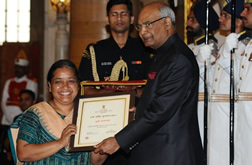 [March 9, 2018] As reported in an article on the KalingaTV website, Sabarmatee, founder of the NGO Sambhav and long-time promoter of SRI, was conferred the ‘Nari Shakti Award’ on March 8 - International Women Day. The Nari Shakti Award, which was initiated in 2015, is India’s highest civilian honor for women. Sabarmatee was presented with the prestigious award by President of India Ramnath Kovind (right), at Rashtrapati Bhavan in New Delhi (see minute 22.26 of the Nari Shakti Puraskar 2018 video).
Apart from Sabarmatee Tiki, 38 other women and institutions were recognized with the award by the Ministry of Women and Child Development of Indian government. They were given the award for their efforts towards the cause of women empowerment.
[March 9, 2018] As reported in an article on the KalingaTV website, Sabarmatee, founder of the NGO Sambhav and long-time promoter of SRI, was conferred the ‘Nari Shakti Award’ on March 8 - International Women Day. The Nari Shakti Award, which was initiated in 2015, is India’s highest civilian honor for women. Sabarmatee was presented with the prestigious award by President of India Ramnath Kovind (right), at Rashtrapati Bhavan in New Delhi (see minute 22.26 of the Nari Shakti Puraskar 2018 video).
Apart from Sabarmatee Tiki, 38 other women and institutions were recognized with the award by the Ministry of Women and Child Development of Indian government. They were given the award for their efforts towards the cause of women empowerment.“Women are strong, bold and patient at the same time,” said Sabarmatee, while addressing at the award ceremony. “We restored 90 acres of wasteland and converted it into a forest. We have organic farms, where a method called System of Rice Intensification is adapted to make it easier for women working in farmlands,” she added. Her NGO, which runs organic and training farms near the city, has been successful in conserving and producing 452 indigenous varieties of rice.
 Special Award at 69th Republic Day for Highest Paddy Yield per Hectare in Tamil Nadu
Special Award at 69th Republic Day for Highest Paddy Yield per Hectare in Tamil Nadu
[January 29, 2018] At the 69th Republic Day, which was celebrated January 25 in the Chennai, Tamil Nadu, R. Munusamy (right) of Kullanur village, Virupatchipuram, Dharmapuri district, received the special award from the State Agriculture department for obtaining highest yield - 18,184.4 kg of paddy per hectare - using System of Rice Intensification (SRI) methods. The award carries `5 lakh and a medal. A New
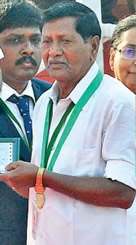 Indian Express article notes that after receiving the award, Munusamy said that normally districts with good rainfall used to get this award and this year, but he had beaten that record and achieved highest yield in a drought-prone district. He also explained how he strictly adhered to the suggestions made by Agriculture department officials, which included adopting an 8 kg seeding rate for his field alternate and managing water by wetting and drying. Munusamy sprayed Neem seed kernel extract twice to control pests and sprayed ‘Panchakavya’ five times, due to which he got bold grains. [For more info, see articles in the New Indian Express and Deccan Chronicle.]
Indian Express article notes that after receiving the award, Munusamy said that normally districts with good rainfall used to get this award and this year, but he had beaten that record and achieved highest yield in a drought-prone district. He also explained how he strictly adhered to the suggestions made by Agriculture department officials, which included adopting an 8 kg seeding rate for his field alternate and managing water by wetting and drying. Munusamy sprayed Neem seed kernel extract twice to control pests and sprayed ‘Panchakavya’ five times, due to which he got bold grains. [For more info, see articles in the New Indian Express and Deccan Chronicle.] National Seminar on Sustainable Rice Production Technology
Held in Chhattisgarh
National Seminar on Sustainable Rice Production Technology
Held in Chhattisgarh
[January 22, 2018] A National Seminar on Sustainable Rice Production Technology for Increasing the Farmers’ Income (NSRT-2018) was held January 20-21, 2018, at the Swami Vivekanand Auditorium, IGKV, Raipur, Chhattisgarh. This event brought together many of the Government, civil society organizations, state agricultural universities, research institutions, students, farmers and manufacturers that have played a key role in upscaling SRI. Include in the program was research by scientists, experts and academia that has helped with greater understanding and dissemination of SRI. The national Seminar also focused on strategies for strengthening collaborative research between the mainstream research institutions and universities with the Tata Trusts supported SRI programme in India. The event was organized by Tata Trusts and IGKV, Raipur, in collaboration with Chhattisgarh chapter of Indian Society of Agricultural Engineers and Chhattisgarh State Centre- Institute of Engineers (India). For more Information, contact the organizers.
2017
 New SRI Book by K. N. Bhatt and Pradeep Bhargava Available
New SRI Book by K. N. Bhatt and Pradeep Bhargava Available
[September 2017] A new publication on the System of Rice Intensification (SRI) authored by K. N. Bhatt and Pradeep Bhargava is now available. The book, which is
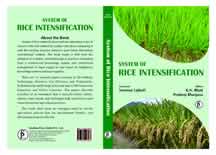 published by Studium Press and has a forward by Norman Uphoff, explores alternative ways of this resource-efficient method for paddy cultivation, comparing it with the existing resource-intensive post Green Revolution conventional methods. The book marks a shift from the adoption of scientificfic and technological practices emanating from a centralized knowledge system and centralized management of input supply to one based on indigenous knowledge systems and local supplies.
There are 15 research papers covering (a) SRI methods, technology, resource use efficiency and productivity, (b) biodiversity and ecological security and (c) SRI future area expansion and policy concerns. The papers describe evolution of an innovation that is basically farmer-centric, reduces water inputs, and challenges high input driven post Green Revolution agricultural practices.
According to the authors, the book meets an emergent need to rewrite agricultural policies that are environment friendly, cost efficient and resource efficient. For information on obtaining a copy of the book, contact K. N. Bhatt or Studium Press directly.
published by Studium Press and has a forward by Norman Uphoff, explores alternative ways of this resource-efficient method for paddy cultivation, comparing it with the existing resource-intensive post Green Revolution conventional methods. The book marks a shift from the adoption of scientificfic and technological practices emanating from a centralized knowledge system and centralized management of input supply to one based on indigenous knowledge systems and local supplies.
There are 15 research papers covering (a) SRI methods, technology, resource use efficiency and productivity, (b) biodiversity and ecological security and (c) SRI future area expansion and policy concerns. The papers describe evolution of an innovation that is basically farmer-centric, reduces water inputs, and challenges high input driven post Green Revolution agricultural practices.
According to the authors, the book meets an emergent need to rewrite agricultural policies that are environment friendly, cost efficient and resource efficient. For information on obtaining a copy of the book, contact K. N. Bhatt or Studium Press directly.
-
For 1999-2016 SRI activities, see SRI India Archives
General Publications, News and Reports
- [See complete India Publications page]
- News Items (English) [currently updated]
- General articles, blog posts and reports (English) [will be updated Nov. 2016]
- News and publications (Indian languages) [up to 2013 only]
- Newsletters
Research and Evaluations
- Chronological listing of research papers about SRI in India (See also conference presentations page)
- Zotero India searchable database [join our global SRI Research Network and have access to bibliography which is keyworded by subject matter.]
- Map of institutions and organizations carrying out research on SRI in India [up to 2014 only]
Practical Information (manuals)
- See all extension and practical manuals about SRI in India
- Practical information about SRI in India by language:
[English] [Hindi] [Oriya] [Tamil][Telugu] - (See also videos with principles/instructions material and demonstrations of SRI methods.)
- (See also newsletters and bulletins)
National Conferences and Symposia
- International Conference on Innovative Climate-Smart Sustainable Crop Production Systems for Livelihood Security (Details forthcoming)
June 20-22, 2019, SRM Institute of Science and Technology (Deemed University), Kattankulathur 603-103 (near Chennai, India) - National Consultation on Up-scaling System of Rice Intensification (SRI)
September 10, 2016, NAAS, New Delhi - Research Conference on the System of Rice Intensification: Research Issues, Priorities and Prospects
August 12-13, 2014, Bhubaneswar, Odisha
Organized by the Livolink Foundation with support from Sir Dorabji Tata Trust and Allied Trusts, Mumbai (SDTT) - Changes in Rice Production and Rural Livelihoods: New Insights on the System of Rice Intensification (SRI) as a Socio-Technical Movement in India
June 19-21, 2014, National Academy of Agricultural Sciences, NASC Complex, DPS Marg, PUSA, New Delhi
Organized by Wageningen University, National Consortium on SRI, and Xavier Institute of Management, Bhubaneswar - SDTT-SRI Partners Meet: Mainstreaming of the SDTT-SRI Program: Achievements and Constraints
March 21-22, 2014, Raipur, Chhattisgarh
Organized by Livolink Foundation, Bhubaneswar; hosted by PRADAN, Raipur; supported by Sir Dorabji Tata Trust and allied Trusts under the SDTT-SRI Programme - Stakeholders' Consultative Workshop
SRI as a Socio-technical Movement in India: Research with Wageningen University, Netherlands
August 2, 2013, Training Hall 2, Xavier Institute of Management, Bhubaneswar, Odisha - SRI National Symposiums
2006 (Nov. 17-18, ANGRAU, Rajendranagar, Hyderabad), 2007 (Oct. 3-5, Agartala in Tripura), 2008 (Dec.1-3, TNAU, Coimbatore) - National workshop on SRI
October 10, 2010 at the National Centre for Agricultural Economics and Policy Research in cooperation with the NGO PRADAN - The International Symposium on System Intensification towards Food & Environmental Security
Feb 24- 27, 2011, Farmers' Training Centre (FTC- Lake Hall), Kalyani, Nadia, West Bengal, India
Organized by the Crop and Weed Science Society (CWSS), Bidhan Chandra Krishi Viswavidyalaya (BCKV), NABARD, Kolkata - National Colloquium on the System of
Crop Intensification (SCI)
March 1, 2011, organized by the Bihar Rural Livelihoods Promotion Society (BRLPS), in Patna, Bihar State - Status of SRI in India: Upscaling Strategy and Global Experience Sharing
March 3, 2011, at the Indian Agricultural Research Institute (IARI) in New Delhi.
Discussion Group (Listservs, Google Groups, Yahoo Groups) in India
- SRI-India: Google Group created in 2007 to promote information and discussion amongst farmers, civil society practitioners, researchers and others interested SRI. The majority of the traffic relates to SRI in India. To subscribe: see http://groups.google.com/group/sriindia or send an e-mail to: sriindia@googlegroups.com.
- SRI-Orissa - Google Group for supporting the learning alliance on SRI in Orissa. To subscribe: http://groups.google.com/group/sriorissa and follow the instructions, or send e-mail to: sriximb@gmail.com (see also website)
- JAI SRI - a Google Group on System of Crop Intensification (SCI) and SRI by the Indian National Consortium on SRI (NCS), a network to enhance the science of SCI, improve cultivation practices, and engage in policy advocacy through learning and sharing. To subscribe: - https://groups.google.com/group/jaisri/subscribe or email jaisri@googlegroups.com
- SSI (sugarcane): The Sustainable Sugarcane Initiative (SSI-India) is a Google Group created in 2009 to provide practical options to sugarcane farmers using practices based SRI principles as SRI. Traffic relates primarily to India. To subscribe: see SSI website (http://groups.google.com/group/SSI-India/) or send an e-mail to: SSI-India@googlegroups.com
SRI Websites and Social Media about SRI in India
- System of Rice Intensification (SRI) Programme "Sir Dorabji Tata Trust (SDTT) And Allied Trusts" (SDTT-SRI)
- WASSAN's SRI web page
- JAI-SRI AP (Joint Action Initiative on SRI-Andrha Pradesh)
- System of Rice Intensification - SRI-India (originally maintained by an ICRISAT/WWF program)
- System of Rice Intensification - Facebook SRI Group for primarily Indian topics
- (See listservs/groups for related groups)
Video and Audio
- Annotated list of videos about SRI in India (not current; see SRI playlists on YouTube)
- In addition to this wider, more current playlist that includes Indian videos, an older version of India-only videos is also available, but is not as current.
PowerPoint Presentations
(Notes: Transcripts are at the bottom of each presentation. There is a "full screen" button at the lower right corner of the presentation to enlarge the presentation. If you have trouble viewing the slideshow, make sure you have Flash installed and JavaScript enabled.)
Photo Gallery

